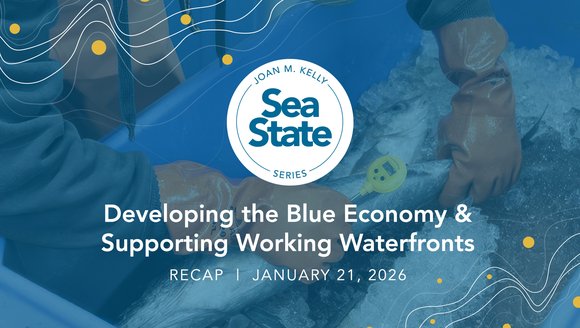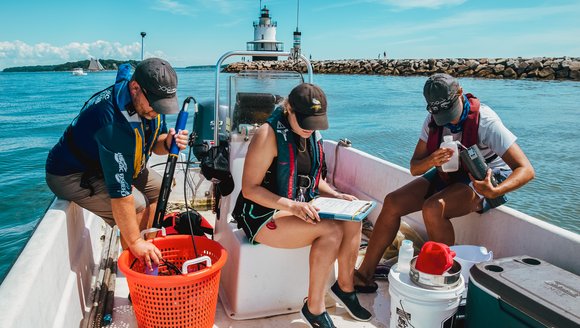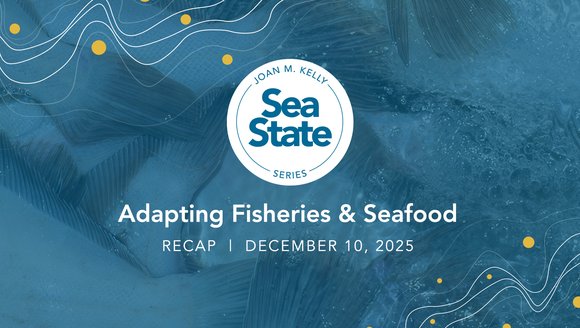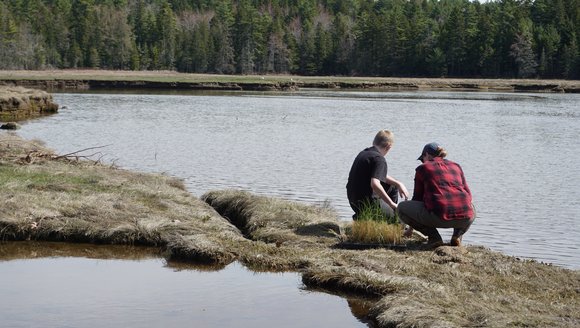Collaborative Solutions: Port Visits Support Engagement in Offshore Wind
Perspectives | Feb 23, 2024
Offshore wind development in the Gulf of Maine is a complex and rapidly-changing issue. Explore our early impact on the ongoing process, providing independent, science-based resources and convening coastal communities to help them provide their essential feedback and insights.

Without a doubt, climate change is the foremost ocean challenge of our time. Offshore wind can be part of the solution — but process matters, and climate solutions that don’t consider the needs of communities aren’t solutions at all. Offshore wind may offer immense economic opportunity, including new jobs, investment, and revenue sources. But to realize these opportunities, the development of offshore wind must recognize and respond to the Gulf of Maine’s cultural, ecological, and economic significance to coastal communities.
Given the complexities and rapid pace of offshore wind development, we must ensure important community perspectives are not overlooked. A process that includes stakeholders representing their interests early and often can help the region address the greatest long-term threat to our marine economy: climate change. Grounding this process in the best available science can reduce the potential to create unintended consequences for the people and marine resources dependent on the Gulf of Maine.
This fall, we led an effort to highlight and incorporate these important community perspectives, engaging a diverse range of coastal stakeholders as the foundation of our role in this space.
Convening Diverse Stakeholders
In November, we worked with the nonprofit Consensus Building Institute (CBI) and SAMBAS Consulting to convene diverse groups of stakeholders for a series of port meetings across the Northeast — all during the Bureau of Ocean Energy Management’s (BOEM) Draft Wind Energy Area public comment period. In 15 port locations, we met with over 160 fishermen, community leaders, and state and federal agency staff. Our staff solicited insights and specific feedback from local voices and on-the-water experts from Maine, New Hampshire, and Massachusetts.

Key issues raised at these meetings included the potential displacement of lobster and groundfish fishermen from their traditional fishing areas, gear conflicts, and loss of waterfront access due to offshore wind development. Stakeholders also questioned the accuracy of models used to plan wind energy sites and stressed the economic and cultural impact on local communities reliant on fishing. They called for more accurate data representation, environmental protections in lease agreements, and additional research on the impacts of wind farms on fishing and marine ecosystems.
These concerns were summarized and highlighted to inform the federal offshore wind development process, with summaries from each port meeting submitted into the federal record and accounted for as public comment — a meaningful step to include these important insights and perspectives in the decision-making process.
It’s both personally meaningful and mission-critical for GMRI that the voices of fishermen and other coastal stakeholders are represented in this process. I’m thankful to every individual who joined these meetings and shared their feedback — and I know this complex process will only be improved as a result.”
Hannah MacDonald Senior Program Manager, Fisheries Engagement
Offering Independent Resources
We prepared for these port visits with the goal of addressing the specific concerns of fishing communities. For fishermen and other busy stakeholders, it can be difficult to keep up with all the important news and opportunities to engage in this fast-moving process. Moreover, the information coastal communities do receive often comes from the government, offshore wind companies, lobbyists, and environmental advocacy organizations — each of which comes with its own set of biases.
That’s why we launched an offshore wind resource hub — to provide an independent, objective, science-based source for offshore wind information and tools to help marine stakeholders contribute constructively and effectively in discussions about offshore wind development in the Gulf of Maine. The hub provides a go-to source for those looking for explanations of the development and leasing processes, environmental reports and research summaries, and upcoming opportunities to engage.
In addition to the resource hub, we also created a Gulf of Maine Offshore Wind Newsletter, which aims to keep coastal communities well-informed, engaged, and at the forefront of this transformative time for the Gulf of Maine.
We understand the unique challenges coastal communities face and the importance of ensuring that interested stakeholders have the best-available information about the risks, uncertainties, and opportunities associated with offshore wind development.
Gulf of Maine Offshore Wind Resource Hub
Offshore wind development in the Gulf of Maine is a complex and rapidly-changing issue posing both risks and opportunities for coastal communities. We provide science-based, objective information to help you stay informed and engaged in this fast-moving process.
Global Insights
The solutions we develop here will be relevant around the rest of the world grappling with the climate challenge. Likewise, our network of international partners and collaborators give us access to the insights of experts and communities that have navigated similar circumstances.
In our role as a bridge organization and convener, we’re engaging international partners, decision-makers, and advisors to share knowledge and best practices. In doing so, we aim to make the process of clean energy development more inclusive of stakeholder needs here in our region and around the world. We spent the fall reaching out to these international partners, including a few notable examples:
St Andrews, New Brunswick: We connected with the Future Ocean and Coastal Infrastructures group — a collaborative research team from Newfoundland, New Brunswick, and the Farro Islands. The group discussed how to collaboratively design and adapt ocean and coastal infrastructures to address future environmental and social challenges while emphasizing sustainability, safety, and inclusivity. Together, we asked how the offshore wind development process can encourage the co-creation of solutions that allow for various ocean stakeholders to be a part of decision-making.
Bedford Institute of Oceanography, Dartmouth, Nova Scotia: At a meeting we organized between the Department of Fisheries and Oceans Canada, BOEM, and the National Oceanic Atmospheric Administration (NOAA), we shared lessons learned, common themes, challenges, and opportunities in the offshore wind development processes taking place across the U.S. and Canada.
Bergen, Norway: GMRI resource economist Dr. Kanae Tokunaga traveled to Norway to present at a workshop hosted by the Nordic Marine Think Tank and International Council for the Exploration of the Sea (ICES). The workshop, part of the second Nordic Climate Change Forum for Fisheries and Aquaculture, was entitled Dealing with Maritime Space and User Conflicts in a New Era of Offshore Wind. During the workshop, Dr. Tokunaga gave a talk called Being a trusted facilitator: Positioning fisheries, biodiversity and offshore wind debates in the Northeast coast of USA , which detailed our stakeholder engagement efforts in the Gulf of Maine. In sharing our approach with this international audience, we hope to promote thoughtful incorporation of community perspectives and needs in similar development processes unfolding around the world.
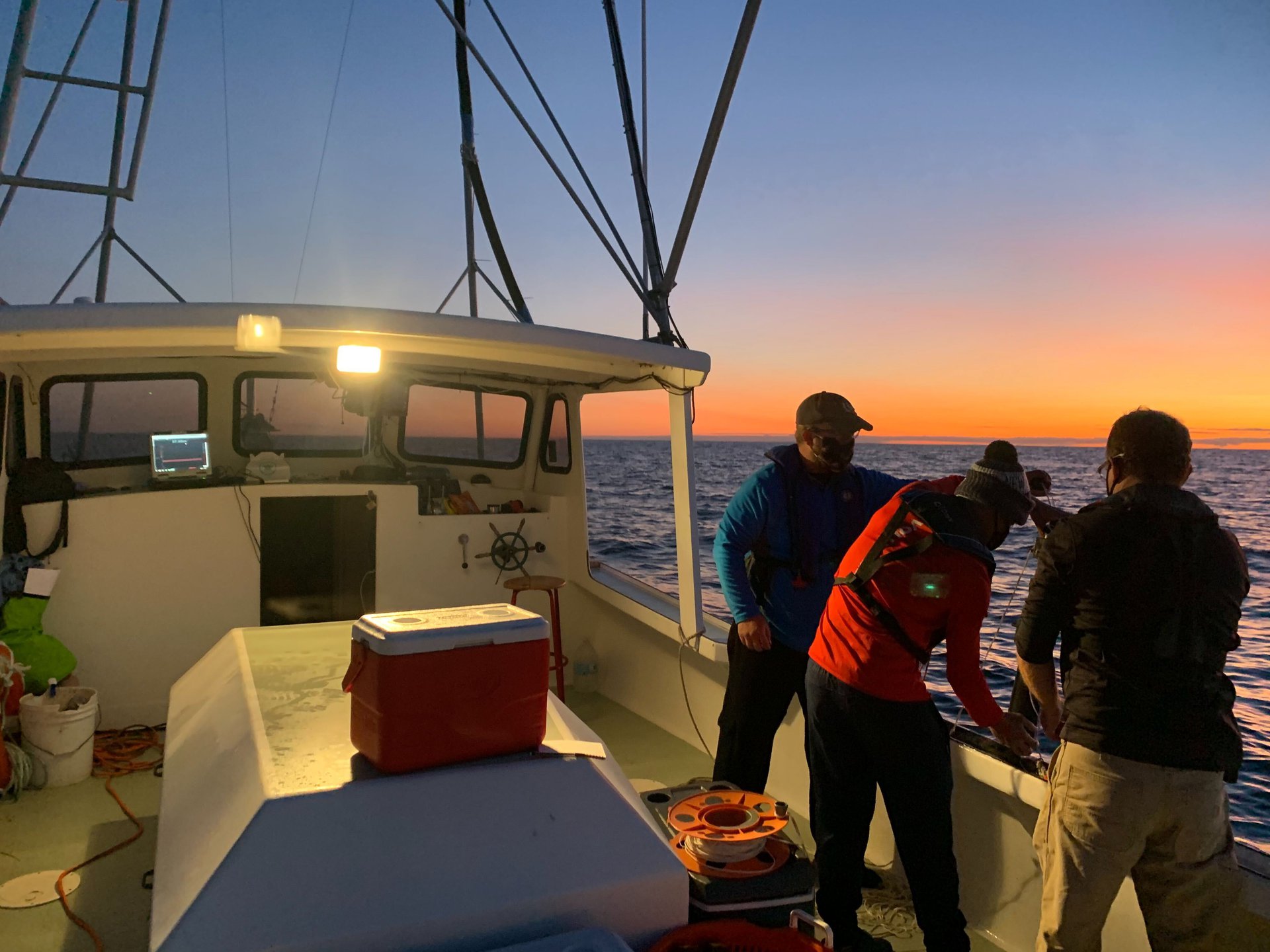
Science-based Approach
As with all the important-but-complex issues we engage in, part of our role as a research institute is to provide the best-available science to support community decision-making.
GMRI scientists are collaborating with other researchers to conduct on-the-water ecosystem monitoring that will create a baseline understanding of the environment that can later be used to assess changes caused by offshore wind development. We will leverage our research vessel Merlin to conduct acoustic surveys and collect environmental DNA data that will inform not only future research directions, but response options for dealing with the changes — positive and negative — that may come from the installation of these arrays.
At sea, our scientists travel along predetermined transects to identify pelagic fish schools, near-bottom fish biomass, and pelagic invertebrate biomass. This will generate a baseline understanding of the current depth of the biological maximum to later identify if turbines change water-column stratification or other features. These samples could be used to ground-truth acoustics survey results to identify species-specific schools and further characterize the pelagic communities. Collecting both acoustic and eDNA baseline information in potential future offshore wind sites will allow for changes in ecosystem ecology to be examined if turbines and moorings are developed in the area.
In addition to ecological research, we’re also engaged in a portfolio of socioeconomic research projects focused on offshore wind development. In January, we hosted 30 social scientists and economics experts to delve into the multifaceted impacts of offshore wind energy as part of a CINAR-funded workshop. We hosted the workshop as part of our efforts to foster interdisciplinary discussions and inspire collaborative research to explore and analyze the socio-economic impacts of offshore wind energy in the Gulf of Maine. Participating experts represented organizations across the East Coast, from Virginia up through Canada. Through interactive sessions, panels, and discussions, participants engaged in a comprehensive examination of ongoing projects related to offshore wind to identify methodologies and consider future research priorities.
In early 2024, the Maine Governor’s Energy Office funded a partnership between GMRI and an environmental consulting firm, Environmental Resource Management (ERM) to explore sustainable coexistence strategies between floating offshore wind and fisheries. The fishing industry is crucial to our regional identity and economy, yet there is limited commercial-scale research on the coexistence between fishing and floating offshore wind and its relevance to the Gulf of Maine fishing industry (i.e., gear and species). Conducting this research will help both industries navigate the integration process, and will promote mutual prosperity. This work will also provide recommendations to the state that could reduce conflicts between the fishing industry and floating offshore wind.
By the Numbers
Exploring our early impact.
Convening Stakeholders
in-person attendees at port meetings


Regional Impact
Port locations throughout New England

Community Voices
public comments received by BOEM and entered into the Public Record
Active Collaborators
partner institutions engaged
Collaboration is Key
Our mission is to develop and deliver collaborative solutions to global ocean challenges. Offshore wind represents a potential climate solution — but only if the process is a true collaboration. In our role as a convener, we know how important it is to work with diverse — and sometimes competing — stakeholders to leverage knowledge, relationships, and resources that increase our shared impact.
For offshore wind to be a true solution for the region, the complicated development process must include both science-informed decision-making and effective community engagement. This approach necessitates collaboration among local, state, Tribal and federal governments, coastal community members, scientists and engineers, utility companies, and wind energy developers.
Constructive stakeholder engagement can minimize and mitigate conflicts that could either harm coastal communities in pursuit of economic opportunities or cause the region to miss out on these opportunities altogether.
In that spirit we want to thank and appreciate the many institutions we’ve networked and partnered with as part of our efforts in this space. These collaborating institutions include:
Fishing and coastal stakeholder groups: Maine Coast Fishermen’s Association, Responsible Offshore Development Alliance, Cape Cod Commercial Fishermen’s Alliance, New Bedford Port Authority, New England Fishermen’s Stewardship Alliance, Maine Coast Sector, Maine Audubon, Natural Resource Council of Maine, The Nature Conservancy, Massachusetts Audubon, Maine Lobstering Union, Maine Lobstering Association, Conservation Law Foundation, Maine Conservation Voters, Maine Climate Action.
State partners: New Hampshire Fish and Game, New Hampshire Sea Grant; Maine Department of Marine Resources, Maine Governor’s Energy Office, Massachusetts Coastal Zone Management and Massachusetts Department of Marine Fisheries, Rhode Island Sea Grant
Federal partners: Bureau of Ocean Energy Management (BOEM), Stellwagen Bank National Marine Sanctuary, New England Fisheries Management Council, Northeastern Regional Association of Coastal Ocean Observing Systems (NERACOOS), and Northeast Fisheries Science Center
International partners: Department of Fisheries and Oceans Canada, Future Ocean and Coastal Infrastructures (FOCI), SINTEF, and National Renewable Energy Laboratory (NREL)
Academic/Consulting partners: University of New Brunswick, University of Rhode Island, University of Maine, Environmental Resources Management (ERM), SAMBAS Consulting, Woods Hole Oceanographic Institution, University of Maryland Center for Environmental Science, Virginia Institute of Marine Science, University of New Hampshire, Colby College, and Roux Institute
Conclusion
Our long-term vision is that a community-centered and science-based approach to floating offshore wind development in the Gulf of Maine reduces our greenhouse gas emissions, ensures a healthy ocean ecosystem, and generates economic prosperity across both the traditional seafood industry and the surrounding blue economy.
The most equitable form of offshore energy development requires an approach that emphasizes the continued, sustainable use of marine resources and promotes shared success among all users, including the fishing industry. Our work in this space will apply this approach in pursuit of a long-term climate solution that considers and includes the needs of the hardworking communities that depend on the Gulf of Maine for their livelihoods and well-being.
